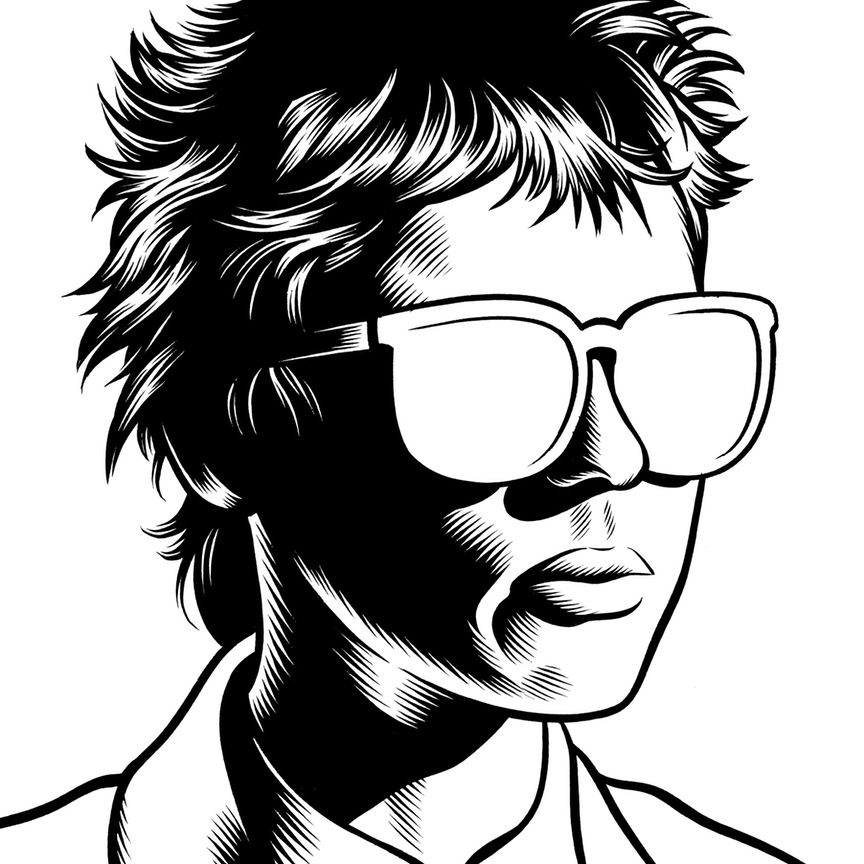
LAURIE ANDERSON: Our dog Lolabelle died.
THE BELIEVER: Oh, I’m sorry.
LA: Yeah, what a sweetie pie. She was my best friend. When you’re very physically attached to something—not so much mentally, but physically, something that is always at your knee, you know—it’s very different when they evaporate. So in The Tibetan Book of the Dead, for forty-nine days you’re in the Bardo, and it describes in a really fascinating way how you lose your senses and how your mind dissolves as you prepare for another cycle. At the end of that forty-nine-day period, you are born in another form, and, in my dog’s case, what was at the end of that forty-ninth day was my birthday. I’m kind of a believer in magic numbers, in a way. So I wanted to study that particular Bardo, and then I found that that’s only one of the many Bardos. The other Bardo that is happening is the Bardo that we’re in right now—in which we both believe we’re having a conversation in a studio by the river when, in fact, we’re not.
BLVR: What are we doing?
LA: Well, I think illusion is one of the most interesting things that I’ve found to think about. I don’t really know how it works, but I know that in some way we are and in some way we’re not having this conversation. Just look at yesterday, and what you were doing, and how important it was, and how nonexistent it is now! How dreamlike it is! Same thing with tomorrow. So where are we living? Tibetans have unbelievably fascinating answers to that. This is what I’m studying because my dog died.
BLVR: Do you have thoughts about death and what happens after death?
LA: Well, no single person who has ever lived will be able to tell you what happens. Period. Nobody’s right and nobody’s wrong. So what do you do, then? With my experience, and how my mind works, and what I think about—let’s call it “the disappearing mind stream”—when you follow your thoughts and watch them attach to certain things, it makes certain things real and other things unreal, and you realize that this is all created by your mind.
BLVR: Yes.
LA: The main thing that attracts me to Buddhism is probably what attracts every artist to being an artist—that it’s a godlike thing. You are the ultimate authority. There is no other ultimate authority. Now, for some artists that’s difficult, because they want to have the art police. They want to have the critic who hands out tickets and says, “That’s too loose.” They want to have that person—it’s very important. “Oh, I got a great review!”—they need to have that. One of the things that’s improved my life enormously in the last two years is that I haven’t read one single thing that’s been written about me, and that is fantastic! I realize that I am a professional artist and I probably should read that stuff, but it never hit me very well. I didn’t like it, and it always made me feel bad, whether it said I was fantastic—and I knew that was a lie—or whether it said that I was a complete fraud, which of course every person thinks is probably true, but you fight that idea. Either way, it would make me feel creepy, and I didn’t like it, and it’s been great. I didn’t need it. It was hurting me in ways that either pumped me up or pushed me down. I thought, What am I doing this for, anyway—the whole thing? And then, of course, it made me realize that I’m not doing it to please x, y, or z critic. I never have been. And I don’t care about being famous or having a lot of people go, “She’s really good.” I don’t care about that, so it was very freeing to realize, Well, what do I care about?
BLVR: And what did you arrive at?
LA: It’s fun! Part of it is the pure fun of making things and thinking about things, and, like I said about Buddhism, being an artist is a totally godlike thing to do—and I have a god complex.
BLVR: A godplex.
LA: Yeah, a godplex! I’m thrilled by the fact that I made something out of nothing. There it is! It wasn’t there before: there it is—I made it! That’s pretty powerful, and that’s the power that Buddhists give to every single person. There is no one judging you; you are the Buddha. And that’s a frightening thought and a liberating thought, that you are the ultimate authority. Every single person and bird and ant has that ultimate authority—so if you can find that and appreciate that, it’s a kind of a revolution.
An interview with Laurie Anderson (January 2012).




